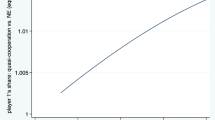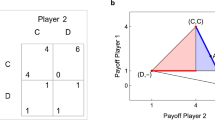Abstract
The impact of the cardinal relationships amongpecuniary payoffs, and of social history and reputation, on thechoice of strategies in four one-shot Prisoner's Dilemma games isexperimentally examined. The results suggest that normalized payoffvalues linked to ``fear'' and ``greed'' are important as predictorsof behavior in the PD games. Success in coordinating on the payoffdominant equilibrium in previous plays of coordination games alsoincreases the probability of cooperative play in the PD games. Theeffect of past play is strongest when individuals are matchedrepeatedly with the same person in previous play, as contrasted tobeing matched randomly with another player.
Similar content being viewed by others
References
Ahn, T.K., Ostrom, E. and Walker, J. (1999). Trust and reciprocity: Experimental evidence from PD games. Working paper W98-34. Indiana University, Bloomington, Workshop in Political Theory and Policy Analysis.
Ahn, T.K., Ostrom, E., Schmidt, D. and Walker, J. (1999). Trust in two person games: Game structures and linkages. Working paper W99-13. Indiana University, Bloomington, Workshop in Political Theory and Policy Analysis.
Berg, J., Dickhaut, J. and McCabe, K. (1995). Trust, reciprocity, and social history. Games and Economic Behavior 10: 122-142.
Bonacich, P., Shure, G.H., Kahan, J.P. and Meeker, R.J. (1976). Cooperation and group size in the n-person prisoner's dilemma. Journal of Conflict Resolution 20: 687-706.
Cain, M.J.G. (1998). An experimental investigation of motives and information in the prisoner's dilemma game. Advances in Group Processes 15: 133-160.
Davis, D.D. and Holt, C.A. (1993). Experimental economics. Princeton: Princeton University Press.
Fehr, E. and Schmidt, K. (forthcoming). A theory of fairness, competition, and cooperation. Quarterly Journal of Economics.
Hayashi, N., Ostrom, E., Walker, J. and Yamagishi, T. (1998). Reciprocity, trust, and the sense of control: A cross-societal study. Rationality and Society 11: 27-46.
Knez, M. and Camerer, C. (1996). Raising levels of cooperation through the precedent of efficiency in coordination games. Working paper. University of Chicago, Center for Decision Research.
Komorita, S.S., Sweeney, J. and Kravitz, D.A. (1980). Cooperative choice in the n-person dilemma situation. Journal of Personality and Social Psychology 38: 504-516.
Kreps, D.M., Milgrom, P., Roberts, J. and Wilson, R. (1982). Rational cooperation in the finitely repeated prisoner's dilemma. Journal of Economic Theory 27: 245-252.
Minas, J.S., Scodel, A., Marlowe, D. and Rawson, H. (1960). Some descriptive aspects of two-person non-zero-sum games. II. Journal of Conflict Resolution 4: 193-197.
Ostrom, E. (1998). A behavioral approach to the rational choice theory of collective action. American Political Science Review 92: 1-22.
Palfrey, T.R. and Prisbrey, J.E. (1997). Anomalous behavior in public goods experiments: How much and why? American Economic Review 87: 829-846.
Rapoport, A. (1967). A note on the ‘index of cooperation’ for prisoner's dilemma. Journal of Conflict Resolution 11: 101-103.
Rapoport, A. and Chammah, A.M. (1965). Prisoner's dilemma. Ann Arbor: University of Michigan Press.
Roth, A.E. (1995). Introduction to experimental economics. In J.H. Kagel and A.E. Roth (Eds.), Handbook of experimental economics, 26-34. Princeton: Princeton University Press.
Sajio, T. and Nakamura, H. (1995). The ‘spite’ dilemma in voluntary contribution mechanism experiments. Journal of Conflict Resolution 39: 535-560.
Schmidt, D., Shupp, R., Walker, J.M. and Ostrom, E. (1998). Playing safe in coordination games: The role of risk dominance, payoff dominance, social history, and reputation. Working paper W97-12. Indiana University, Bloomington, Workshop in Political Theory and Policy Analysis.
Schotter, A. (1998). Worker trust, system vulnerability, and the performance of work groups. In A. Ben-Ner and L. Putterman (Eds.), Economics, values, and organization, 364-407. New York: Cambridge University Press.
Scodel, A., Minas, J.S., Ratoosh, P. and Lipetz, M. (1959). Some descriptive aspects of two-person non-zero-sum games. Journal of Conflict Resolution 3: 114-119.
Taylor, M. (1987). The possibility of cooperation. New York: Cambridge University Press.
Author information
Authors and Affiliations
Rights and permissions
About this article
Cite this article
Ahn, T., Ostrom, E., Schmidt, D. et al. Cooperation in PD Games: Fear, Greed, and History of Play. Public Choice 106, 137–155 (2001). https://doi.org/10.1023/A:1005219123532
Issue Date:
DOI: https://doi.org/10.1023/A:1005219123532




